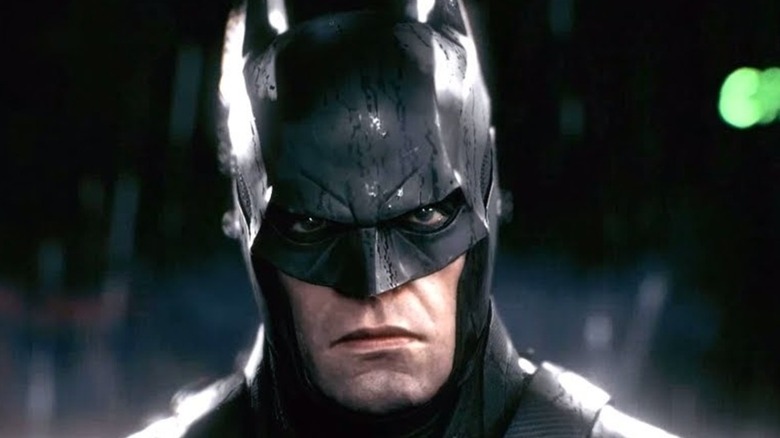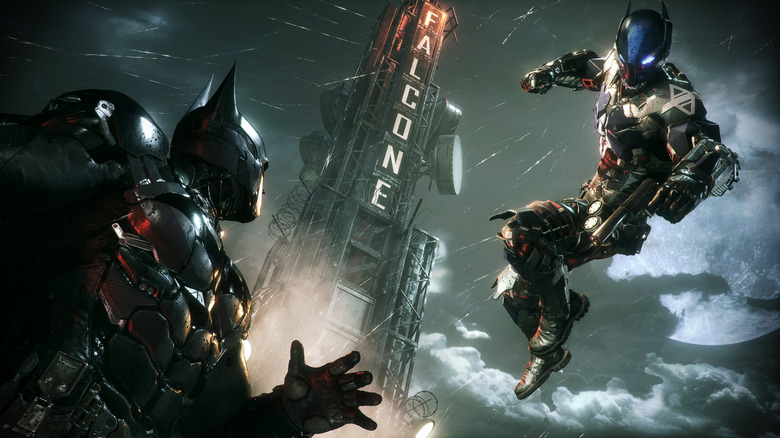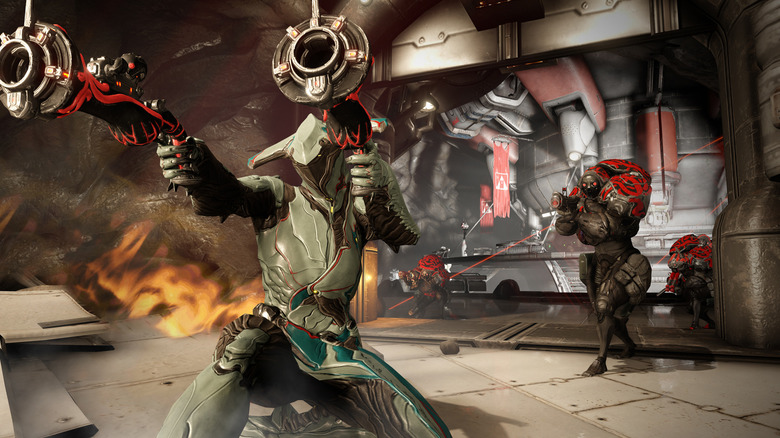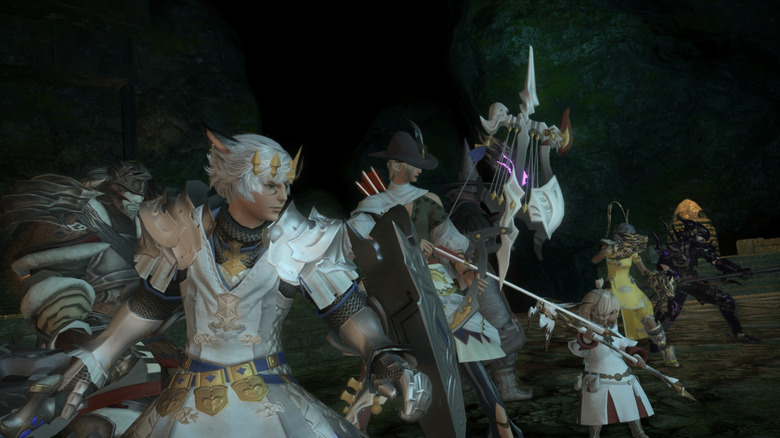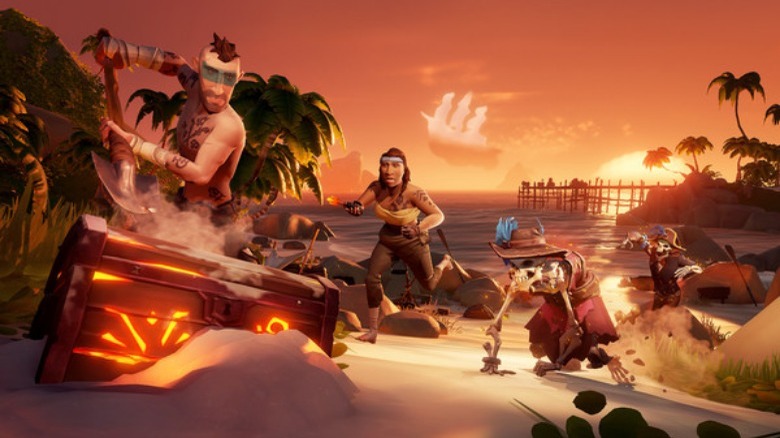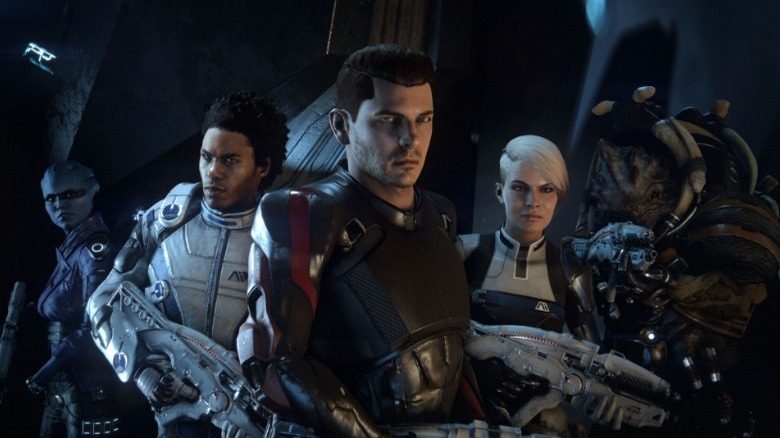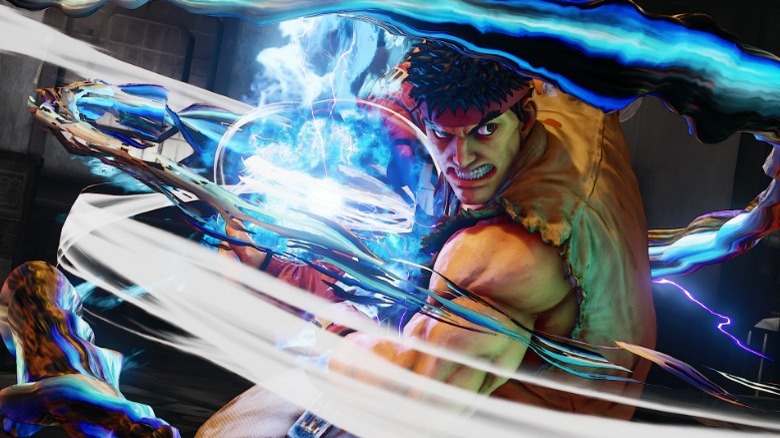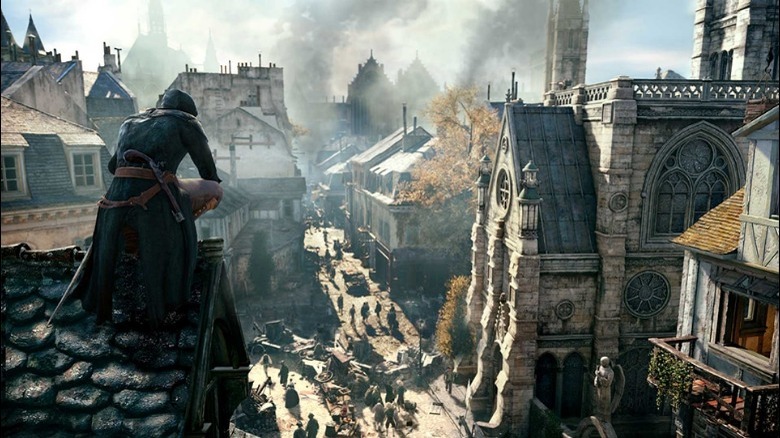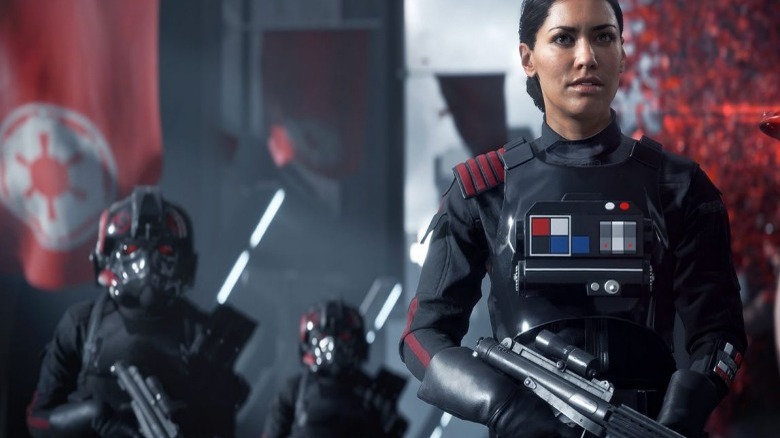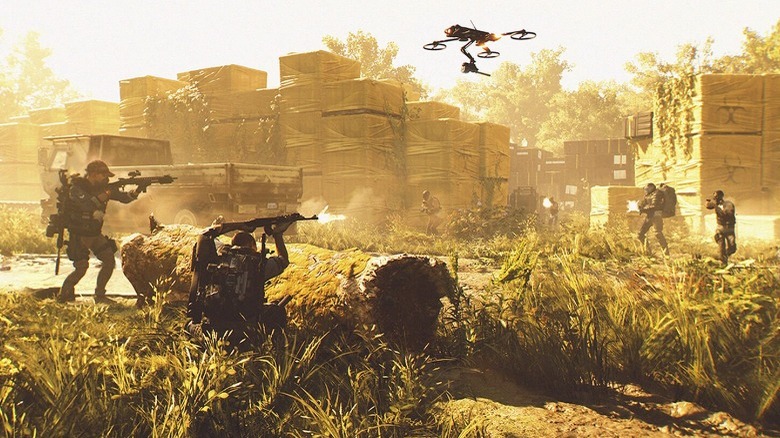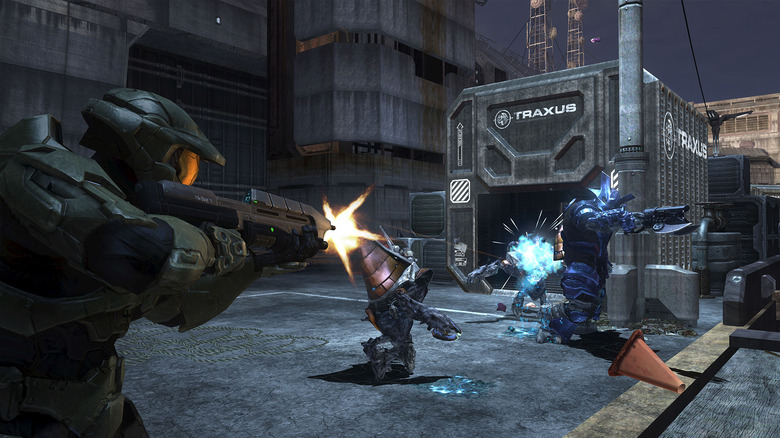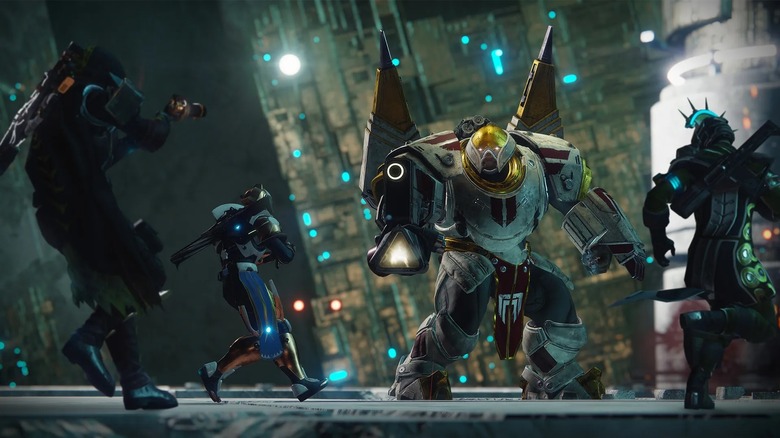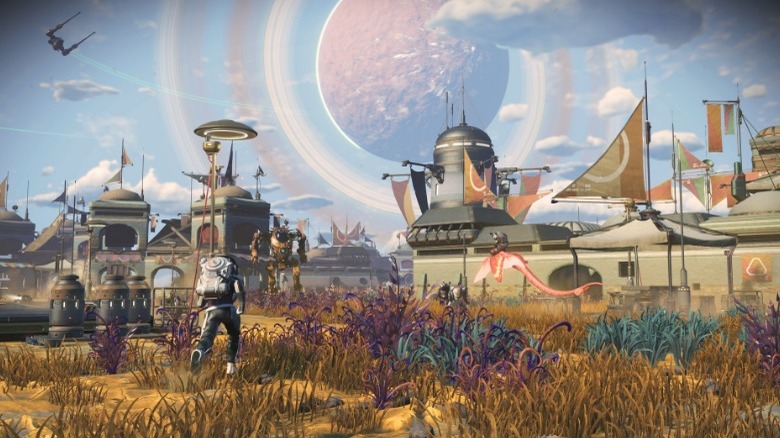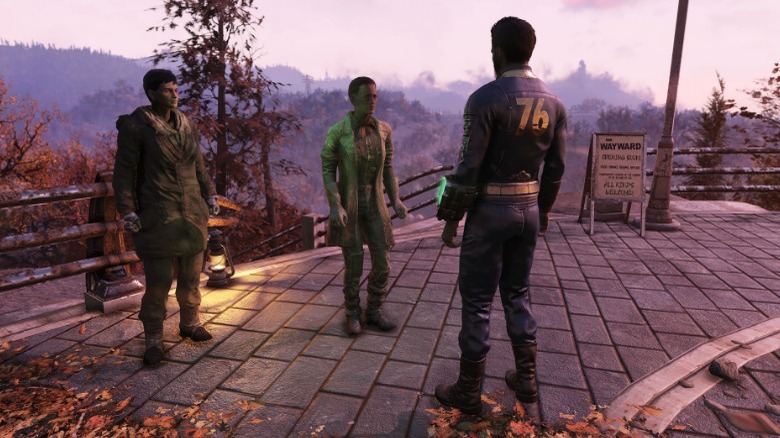Games That Took Years To Get A Positive Review
Some view the act of developing video games from a purely financial perspective, and few statistics are more important than short-term quarterly gains in the world of business. Did a game release to praise and millions of sales? If yes, greenlight a sequel. Greenlight two sequels. Heck, greenlight a movie adaptation! If not, why bother dumping any more time or money into it? Because opinions, especially regarding entertainment, are rarely static, and the term "gone gold" (i.e., when game development has "finished") doesn't mean what it used to.
In the old days, if a video game was savaged by reviews, audiences could either soldier on, bury the game in a trash dump, or just play better titles. Now, thanks to the magic of the internet, developers can continue to patch and improve games long after release. Studios no longer have to worry about putting their best foot forward — well, they do, but they now have a safety net.
While the ability to patch games produced a "launch it now, fix it later" mentality that has resulted in a slew of broken projects at launch, it has also permitted companies to repair opinions and critical reception. An update and patch here, a hotfix there, and suddenly a game that was poorly received because of a face-eating glitch is viewed more favorably. Sometimes these updates can take years, but if a studio is truly dedicated, developers can turn their fortunes and review scores around. Here are games that finally got decent reviews well after their release.
Batman: Arkham Knight (PC version)
If you want to find the king of multimedia franchises, look no further than Batman. The character has starred in more than one award-winning animated series, and "Batman" movies essentially kickstarted the superhero movie craze (twice). Also, one of the best superhero video game trilogies on the market, you guessed it, features Batman. Every entry in the "Batman: Arkham" series was gold at launch, assuming you played on console. On PC, the trilogy couldn't even go out with a whimper.
"Batman: Arkham Knight" was a two-faced monster when it launched in 2015. Outlets that reviewed the console version, such as IGN, experienced a lavish, polished send off to the trilogy. Meanwhile, those who played on PC only experienced headaches, and audience reviews reflected this. No matter the hardware, performance and frame rate issues blanketed PC playthroughs like a swarm of bats (per Polygon). Rocksteady Studios tried its best to resolve issues, but the task was too great even for those coders. Eventually, Warner Bros. Interactive Entertainment broke the crushing news that "Arkham Knight" might never be fully fixed. And yet, several years after release, outlets such as Kotaku and Eurogamer have revisited the PC version and given it two bat-thumbs up.
You might wonder how "Batman: Arkham Knight" managed to improve when its developers gave up on it. Did a cadre of vigilante programmers fix what a team of professionals couldn't? No, gamers and reviewers just brute-forced it into obedience with stronger hardware. Performance issues stood no chance against three years of CPU and GPU upgrades.
- Release Date: June 23, 2015
- Available On: PC, Xbox One, PlayStation 4
- Genre: Action, Adventure
- Game Modes: Single-player Campaign
- Metacritic Score: 70 (PC), 85 (Xbox One), 87 (PlayStation 4)
Warframe
Trying to produce a new IP is no easy task. Even if the game's concept is as preposterously awesome as superpowered ninjas in space, you've got your work cut out for you if your only past experience is developing single-player and tournament shooters ... and pinball games. Success isn't guaranteed out of the gate, but it is possible through hard work and feedback.
When Digital Extremes first launched "Warframe," critics and reviews were fairly divided. The gameplay and soundscape were leagues above what most AAA titles provided at the time, but reviewers were disappointed by the lack of variety and over-reliance on grinding (via GameSpot). The resulting experience wasn't terrible, but it wasn't amazing, either. Thankfully, that's what patches are for.
Throughout the years, Digital Extremes kept adding content. Lapsed players like TotalBiscuit found themselves drawn to the improved experience, and subsequent reviews (per IGN) reflected these positive changes. What was once a game of endlessly running through sci-fi hallways as gun-blender hybrids transformed into an expansive offering with open worlds, storylines, and even more creative ninja suits to slaughter enemies.
"Warframe" is a case study in never giving up, even if it takes you 15 years to turn your vision into reality.
- Release Date: March 25, 2013
- Available On: PC, Nintendo Switch, Xbox One, Xbox Series X|S, PlayStation 4, PlayStation 5
- Genre: Action RPG, third-person shooter, MMO
- Game Modes: Single-player Campaign, Online Multiplayer (Up to 4)
- Metacritic Score: 69 (PC), 86 (Switch), 62 (Xbox One), 64 (PlayStation 4)
Final Fantasy 14
Sometimes, you can salvage a bad game. Just rip out what doesn't work and polish what does. Other times, a game is so messed up you have no choice but to start over from scratch.
After Square Enix impressed audiences with "Final Fantasy 11," the company tried to recapture lightning in a bottle with "Final Fantasy 14." Instead, the company electrocuted itself. Reviewers like GameSpot tore the game apart and roasted everything from its UI to its quest system. It didn't help matters that the game ran like a glacier because environmental assets sported as many polygons as player characters and were copy-pasted ad nauseum (via Speakers Network). Instead of trying to fix "Final Fantasy 14," Square Enix let it die. Like, literally die. The developers canonically set the original game's word aflame with a draconic apocalypse.
Two years after the disastrous launch of "Final Fantasy 14," Square Enix tried again with Version 2.0, a.k.a. "Final Fantasy 14: A Realm Reborn." The team utilized a new game engine and rebuilt everything, including the UI and assets. Critics and audiences praised the relaunch (per IGN), and this second attempt has only improved with time. "Final Fantasy 14" may have even supplanted "World of Warcraft" as the most popular MMO out there, although that might be more to do with the current exodus of "WoW" players (via Kotaku) seeking asylum from a company that isn't being accused of toxic workplace culture.
If "Final Fantasy 14" wasn't the "WoW" killer at launch, it just might be now.
- Release Date: Sept. 30, 2010 (original) and Aug. 27, 2013 ("A Realm Reborn")
- Available On: PC, PlayStation 4, PlayStation 5
- Genre: Adventure, MMORPG
- Game Modes: Single-player Campaign, Online Multiplayer (Up to 8)
- Metacritic Score: 89 (PC), 86 (PlayStation 4)
Sea of Thieves
A video game studio is a lot like a pirate. If successful, it can plunder the wallets of countless individuals, but it can't expect this success at the start. It doesn't matter what name a company made for itself previously; when it starts working on a new ship, it has to swab the poop deck before it can collect those doubloons.
When Rare introduced its multiplayer action game "Sea of Thieves," audiences weren't exactly ready to set sail on the digital waves. Players like AngryJoeShow praised the game's presentation, while others found it lacking in content (via IGN). Content creator Crowbcat even went so far as to claim "Sea of Thieves" was an early access title flying the colors of a fully developed game. But, Rare wasn't ready to abandon what some might have considered a sinking ship.
The studio stuck with "Sea of Thieves," honing its strengths and patching up gameplay. Two years after launch, IGN returned to "Sea of Thieves" and found an enjoyable, party-focused experience, as well as new, story-driven content in the form of Tall Tales. While "Sea of Thieves" hasn't quite shored up its monotony problems from the early days, it has still come a long way in other respects.
Mass Effect: Andromeda
Nothing pains gamers quite like watching companies they once regarded as bastions of gameplay and storytelling release sub-par titles. When this happens, it's easy to point fingers and assume the honeymoon period is over. But when you step back and take a closer look at the game, you might realize it wasn't as bad as initially thought. After it was patched, that is.
"Mass Effect: Andromeda" will go down in history as the fan-proclaimed death knell for BioWare. The title was greeted with a slew of negative reviews that emphasized its lack of polish and infestation of bugs and glitches (per AngryJoeShow). While individuals like IGN's Dan Stapleton found enjoyment in the entry, those voices were few and far between. No matter what BioWare did to patch out bugs and fix the cutscenes, "Andromeda" couldn't escape the black hole of disappointment.
It's been over four years since "Andromeda" launched, and BioWare's latest offering, "Anthem," seemingly confirmed "Andromeda" wasn't a one-off mistake. Or was it? Curious gamers such as Downward Thrust and jayvee, who returned to "Andromeda" after the fires died down, discovered it is better than they remember. That doesn't mean "Andromeda" can join the original "Mass Effect" trilogy in the hall of stellar video games, though. "Mass Effect: Andromeda" is still held back by a myriad of issues — especially in its writing — but in a vacuum, the game is good. Not great — but "good" is an improvement over its initial reception.
- Release Date: March 21, 2017
- Available On: PC, Xbox One, PlayStation 4
- Genre: Action RPG
- Game Modes: Single-player Campaign, Online Multiplayer (Up to 4)
- Metacritic Score: 72 (PC), 76 (Xbox One), 71 (PlayStation 4)
Street Fighter 5
Before patches were a thing, Capcom had its own method of updating games: sell a new version as a separate product. That's how players got "Street Fighter 2," "Street Fighter 2: Champion Edition," "Street Fighter 2 Turbo," "Super Street Fighter 2," "Super Street Fighter 2 Turbo," and "Hyper Street Fighter 2." Capcom didn't abandon this tactic after online updates and DLC made it obsolete, even using it to redeem one of the worst entries in the franchise.
At launch, "Street Fighter 5" was the epitome of "launch it now, fix it later." With only a 16-character roster (via Forbes), poor online performance, and no arcade mode, the game didn't have enough of a skeleton to be considered barebones. This was reflected in its reviews, and these opinions wouldn't reverse until Capcom updated the game and marketed it as a new item.
Two years after "Street Fighter 5" released, Capcom published "Street Fighter 5: Arcade Edition," a giant patch of a game that packed in extra characters and modes. To Capcom's credit, the update was free for everyone who purchased vanilla "Street Fighter 5" and reviews were positive for a change (per GamingBolt). However, Capcom wasn't finished and released yet another version, "Street Fighter 5: Champion Edition," in 2020.
"Street Fighter 5" started with quite the handicap, but it eventually won the fight against bad reviews. Here's hoping Capcom learns from its mistakes for the next round of "Street Fighter" entries.
- Release Date: Feb. 16, 2016
- Available On: PC, PlayStation 4
- Genre: Fighting
- Game Modes: Single-player Campaign/Arcade mode, Local Multiplayer (Up to 2), Online Multiplayer (Up to 2)
- Metacritic Score: 74 (PC), 77 (PlayStation 4)
Assassin's Creed: Unity
In video games, bugs and glitches are not created equal. Some are so minor (or hilariously bizarre) that they can either be ignored or add a sense of charm to the game in the same way a scar can give someone character. Other times, bugs and glitches are so omnipresent that they roadblock any sort of enjoyment — or positive review score.
For its time, "Assassin's Creed: Unity" was one of the most ambitious entries in the franchise, but that very ambition broke the camel's back. At launch, many reviews noted (per ACG) that the game's performance could be buttery smooth one second but turn into a PowerPoint Presentation the next. The only aspect that disappeared more than framerates was NPC faces, and those were only the most infamous issues. "Assassin's Creed: Unity" was so unstable at launch that many gamers joked that the "Unity" in its title stood for its game engine.
The game was in such a sorry state, Ubisoft apologized (via PC Gamer) and tried to placate angry customers with free games, but freebies only go so far. The company also quickly patched many bugs and performance problems (via IGN), but the damage had already been done. "Assassin's Creed: Unity" left such a sour taste in gamers' mouths that they tried to forget it ever existed. It took players like Game Informer's Joe Juba around a year to discover that "Unity" had not only been fixed, it was actually good at last.
- Release Date: Nov. 11, 2014
- Available On: PC, Xbox One, PlayStation 4, Stadia
- Genre: Action-adventure, stealth
- Game Modes: Single-player Campaign, Online Multiplayer (Up to 4)
- Metacritic Score: 70 (PC), 72 (Xbox One), 70 (PlayStation 4)
Star Wars: Battlefront 2
When "Star Wars Battlefront 2" launched, the game was regarded as a giant disturbance in the Force. Critics like IGN praised the game's visuals and actual inclusion of a story mode, but nobody could ignore the loot boxes that drained all the life and fun from the title. Instead of letting gamers improve characters by playing, the most expedient way to get stronger was to use real money and purchase expensive digital chests that doled out random upgrades. It didn't take long for government officials around the globe to accuse Electronic Arts of using the game to promote gambling (via The Washington Post).
EA fought long and hard to keep loot boxes in "Battlefront 2," but after a year of incorrigibility — and Disney purportedly threatening to cancel EA's "Star Wars" exclusivity license (per MP1st) — the company finally surrendered and pulled loot boxes from the game (via Business Insider). IGN's review improved after audiences could finally progress through "Battlefront 2" by actually playing instead of inserting their credit card numbers. Additional content, such as new armies that were patched into the game, also helped.
"Star Wars Battlefront 2" might have initially been steeped in the dark side of game monetization, but after millions of voices cried out in anger and refused to be silenced, the game slowly crawled its way towards the light.
- Release Date: Nov. 17, 2017
- Available On: PC, Xbox One, PlayStation 4
- Genre: First-person shooter, third-person shooter
- Game Modes: Single-player Campaign, Local Multiplayer (Up to 2), Online Multiplayer (Up to 40)
- Metacritic Score: 65 (PC), 66 (Xbox One), 68 (PlayStation 4)
The Division
When you think of video games that flaunt the "Tom Clancy" name, your mind probably jumps to tactical and stealth titles in which plots revolve around government conspiracies and life and death are separated by a single bullet. How do you weigh that sort of preference for realism with the balance necessary to make a fun MMO? With practice.
When "Tom Clancy's The Division" released in 2016, audiences expected a lot from it thanks to its gameplay trailer. An expansive world, rewarding gunplay, and tactical co-op were all advertised, but in true Ubisoft fashion, the trailer was seen to be disingenuous. Audiences found the actual game experience divisive, as everything it did right was countered by something it did wrong. For all the fun gameplay, the enemies were far too bullet-spongey and samey (per ACG), and critics who praised the game world's and environmental storytelling weren't as impressed by the plot (via AngryJoeShow). The result was a solid "Meh" until DLC started pouring in. By 2018, players like Skill Up initially disappointed by "The Division” finally felt the game was complete and worthy of a good review.
In 2019, Ubisoft released a sequel, "Tom Clancy's The Division 2," which demonstrated that the company had learned from its mistakes. Critics who slammed "The Division," like AngryJoeShow, praised its sequel; some even went so far as to claim it is the title all other looter shooters should be measured by (via Skill Up). Normally, obtaining such an honor would be a tall order, but "The Division" was up to the task.
- Release Date: March 8, 2016
- Available On: PC, Xbox One, PlayStation 4
- Genre: Action RPG, third-person shooter
- Game Modes: Single-player Campaign, Online Multiplayer (Up to 4)
- Metacritic Score: 79 (PC), 80 (Xbox One), 80 (PlayStation 4)
Halo: The Master Chief Collection
When a studio celebrates an historic, beloved franchise that changed the very face of gaming, it should take great pains to ensure any rereleases live up to recollections colored by rose-tinted nostalgia goggles. If a game that rewrote how FPS titles do multiplayer is ported to new platforms without a properly functional multiplayer, something is very wrong.
"Halo: The Master Chief Collection" was the talk of the town before release, but when it launched in 2014, the game was nuked from orbit by a flood of problems and bad reviews. The single-player campaign was broken; audio and save files didn't function, and the multiplayer matchmaking system was completely borked. 343 Industries tried its best to patch the collection, but it was a veritable hydra of problems: For every bug fixed, two more took its place. 343 called it quits before the game was anywhere near fixed to focus on "Halo 5: Guardians," and not even patching "Halo 3 ODST" into the collection comforted players.
After "Halo 5" launched, 343 went radio silent. Would the studio ever fix the "The Master Chief Collection"? Could it even be fully fixed? Questions swirled and doubts swarmed, but late 2017/early 2018, the studio returned to finish the fight. Not only did 343 finally patch out problems that had plagued the game since 2014, the studio also finally added the legendary "Halo: Reach," ported the collection to PC, and even started adding new content. By 2019, "The Master Chief Collection" had redeemed itself in the eyes of gamers.
Now if only 343 could port "Halo 5" to PC.
Destiny
When Bungie announced it would pass the "Halo" torch onto 343 Industries, audiences were anxious for Bungie's next project. Since "Halo" revolutionized the FPS, surely Bungie's take on the genre would be destined for greatness.
When audiences booted up "Destiny" on launch day, they enjoyed the experience for what little time it lasted (emphasis on "little"). Reviewers like AngryJoeShow praised the game's soundtrack and art design but decried its campaign. Not only was the story woefully short, it seemingly only existed to tempt players into buying DLC. Granted, the season pass expansions improved the game, but that didn't remove the base experience's shortcomings.
Many expected Bungie to continue the DLC train, but instead the company surprised gamers with "Destiny 2." Unfortunately, history repeated itself and the sequel shipped with a ton of mistakes, most notably yet another short campaign seemingly meant to sell another season pass (per Skill Up). When the DLC started landing, reviews improved. This pattern even continued after Bungie split with Activision.
Does this mean that Bungie was better off without Activision? Is the publisher to blame for all of the "Destiny" franchise's mistakes? Fans probably won't know until "Destiny 3" releases, if ever.
- Release Date: Sept. 9, 2014
- Available On: Xbox 360, Xbox One, PlayStation 3, PlayStation 4
- Genre: First-person shooter
- Game Modes: Single-player Campaign, Online Multiplayer (Up to 3)
- Metacritic Score: 75 (Xbox One), 76 (PlayStation 4)
No Man's Sky
It's not uncommon for game developers to overpromise upcoming titles. After all, it's easier to ask for forgiveness from not living up to expectations than putting in the effort to meet them. But, can you really accuse a developer of overpromising its game's features if they patch them in ... several years later?
"No Man's Sky" is the archetype of an overhyped title. The developers at Hello Games promised a literal universe of explorable, procedurally generated planets, full of worthwhile content. Given the marketing, audiences expected "No Man's Sky" to explode in popularity, but instead it imploded in infamy and could be summed up in one word: dull. AngryJoeShow tore the game apart for its repetitive nature and lack of promised features. What players received was essentially the alpha version of "Minecraft" in space, and they let Hello Games know their anger.
Calling the launch of "No Man's Sky" an absolute disaster would be generous, but the devs never gave up on their vision. Throughout the years, the team added new content such as player housing, dedicated stories, and a genuine multiplayer component. The updated experience is barely recognizable from the vanilla "No Man's Sky" that soured audiences on the title, and with the game's new face came new reviews. It might have taken five years, but "No Man's Sky" is now, as reported by TheGamer, rolling in positive reception.
Some developers choke on their own ambitions, but Hello Games demonstrated that with enough time and work, any game can become a delicious, three-course meal of fun.
- Release Date: Aug. 9, 2016
- Available On: PC, Xbox One, Xbox Series X|S, PlayStation 4, PlayStation 5
- Genre: Action-adventure, Survival
- Game Modes: Single-player Adventure, Online Multiplayer (Up to 32)
- Metacritic Score: 61 (PC), 77 (Xbox One), 71 (PlayStation 4)
Fallout 76
"Fallout" games are primarily single-player experiences about wandering the irradiated wasteland of the future with allies who come in a variety of shapes, moralities, and mutations. Somewhere along the line, gamers asked what it would be like to play the game with friends. They eventually got their wish, but it was more disappointing than a security robot that can only clean coffee cups.
During E3 2018, Bethesda Game Studio's executive producer, Todd Howard, revealed the MMO "Fallout 76" and made virtually every promise under the sun. But when the game was released, audiences accused him of lying. The game was broken and buggy at launch, as well as devoid of the story-driven, NPC-centric spice that made the franchise special. Had that been the end of it, audiences could have looked the other way, but as time went on, Bethesda seemingly did everything in its power to nuke its reputation. This included patching in non-cosmetic microtransactions, refusing to honor refunds, and scamming people with nylon bags and bad rum.
Given the nuclear dumpster fire that was "Fallout 76," nobody would have been surprised if Bethesda abandoned the game, but to its credit, the company has been making baby steps towards fixing its bugs and design oversights. In 2020, Bethesda added the free "Wastelanders" expansion, which finally populated the game world with NPCs. By all accounts, "Fallout 76" is actually good now (per Kotaku). It is still easily the worst "Fallout" game out there, but at least now it's better than it once was. Sometimes, you just need small victories.

